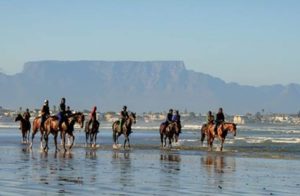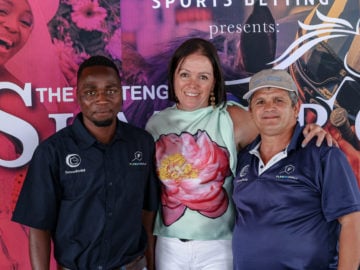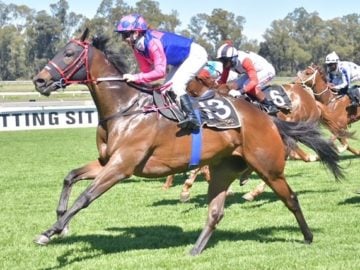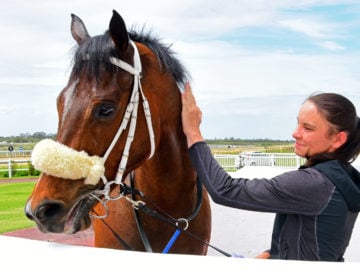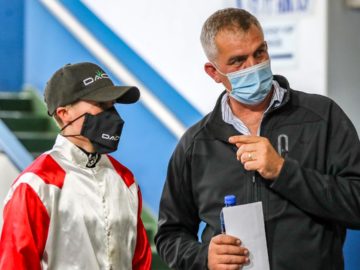South Africa is blessed with abundant agriculture and a lot of our employment practices reflect that. However, political and socio-economic changes have seen the evolution of employment law and the introduction of words such as employment equity, upliftment and transformation into our working lexicon. We have also had to incorporate work permits, ID documents, FICA, CCMA and EFT payments into our employment practices. In short, we are being dragged wholesale into the current century.
While we have come a long way since the ‘dop system’, high profile labour disputes indicate the situation to be a work in progress at best.
Racing is no different and we are increasingly under the spotlight for the plight of our grooms. We’ve had the formation of the SA Grooms Association (SAGA), the SA National Grooms & Trainers Association (SANGATA) and the most recent initiative, the 1% grooms’ stake share, which has met with mixed reactions.
Someone trying to create order out of the chaos is Cape-based trainer, Glen Puller.
Glen’s facilities at the Milnerton training centre are particularly eye catching – the brickwork has been painted red, the car park flower boxes are well-tended and filled with blooms and the inside of his yard is equally immaculate. There is a sense of energy, order and purpose. Inside the office, there’s an attractively appointed entertainment area, freshly painted and tastefully tiled. His office, situated separately and off to one side, is similarly orderly and the desk planner, wall calendar and desk calendar, plus large clock above the door, all point to a particularly fastidious owner. The only concession is the pack of Camel Black cigarettes which Glen dips into periodically as we chat, although even those seem to have their designated place.
Necessity is the mother of invention
Like his office, Glen is neat and tidy and he is quietly, but firmly spoken. He explains that what prompted the change was a complaint over the payment of grooms’ salaries a few months ago. He explains, “Although payment isn’t technically due until the end of the working day, with the changeover to electronic transactions, we usually do an EFT in the morning. Unfortunately, because of load shedding, our EFT run was delayed and payments were only made after lunch and the grooms were unhappy. I tried to explain that the situation was out of our control.” It wasn’t good enough. The following morning, the grooms downed tools and refused to work. “They requested a meeting, which was not practical because it was a race day and I had five runners to get to races. Eventually the float for our first runner had left and my horse wasn’t on it. Nevermind that, the strings hadn’t been exercised, horses hadn’t even been fed and it was all getting out of control. I rang Steve Naude to explain and he said he’d scratch my first two runners, but to see what I could do about the next three.”
“After a bit of consideration, I decided I wasn’t going to let them stop our races and resolved that if I was going to try for three, I might as well go all out. I rang back and told Steve I was going to do all of it. Then I picked up the phone and rang everyone I could think of – friends, patrons, farm staff – anyone to come and help. One of the guys at the farm was supposed to have the day off and I rang and said his day off was cancelled and he had 25 minutes to get to the stables. When he arrived, I was waiting with the horse ready with a bridle and halter. He came through the front door, I handed him the horse and he just kept walking straight out the back and onto the float. He’d never been to races and asked what he had to do and I just said ‘just go, they’ll tell you when you get there!’” I had to stay behind at the yard all day to manage things and with the help of friends and patrons we managed without staff and carried on racing. It was quite exciting really, although I wouldn’t like to do it again,” he says with a wry smile.
The grooms called in the CCMA and a disciplinary procedure was set. The CCMA found that the strike had been illegal and all the grooms lost their jobs.
Blessing in disguise
“I’d always thought if I end up with a strike, I’ll be finished, done. And then the day arrived and somehow we managed and it’s turned out a blessing in disguise.” In order to cope, he sent a number of his string to his farm in Philadelphia and kept the yard going with help from friends, patrons and the Cape Town apprentice academy also jumped in to help. “Some of the owners were worried that it would affect the horses, but despite such a big disruption, the horses seemed to enjoy the change. It freshened everyone up and we actually started doing better. It’s a pity, because the grooms actually missed out – that would have been their money,” he says thoughtfully. “Quite a few approached me wanting to come back and I had to explain that they hadn’t needed to leave in the first place. Unfortunately you can’t take back just one or two – it’s all or nothing and I had to stick with the CCMA’s ruling. It’s a pity as I lost some good guys, but sadly in the end they’re the ones who lost out.”
“The whole thing got me thinking. In any yard, there’s always a click that is in charge. That click organises all the best horses for themselves and the rest of the grooms end up with horses that don’t earn, so they never benefit. I think that’s unfair. Consider the feed guy – he’s there before everyone else and he leaves after everyone else because he has to clean up. He’s probably got the most important job in the place, but because he never looks after a horse, he will never earn any extra money. And because he doesn’t have a horse, he has to clean up after the other guys – even though they’re the ones making the mess! It just didn’t make sense.”
A better way
He called in the help of Reynhard Carelse of the Comco Group of Companies. “Reynhard had helped me out a few years ago when there was a spate of strikes. By some miracle I’d kept his number all these years and went to see him. Part of his company deals with recruiting and so we sat down and discussed the situation and tried to find a better way.”
“In racing, a lot of things are done the way they are simply because that’s the way the previous guy did it. We are all different and we all do things our own way and I figure if I pay, things should be run my way. I’m a racehorse trainer. I need to train horses and get to races, otherwise I have no business. So I thought we’d try things a little differently.”
“I discussed my requirements with Comco and I decided we don’t need a head man. Instead we drew up rosters and made lists of horses to pull out and we all work together as a team. There’s none of this business of one guy sitting on the grass in the sun while the rest are working – a team doesn’t function on the efforts of one or two people, it takes everyone pulling in the same direction. We do get guys who have come from other yards and are used to the traditional way of doing things, so it can be hard for them to deal with, but it’s their choice whether they want to stay.”
“Glen Puller Racing doesn’t employ anyone. Comco sources staff and handles things like contracts, salary payments, etc. Everyone has a contract, so everyone knows what the expectations are and where they stand in terms of hours, payment and overtime. If there are any problems, a dispute, a disciplinary, someone calling in sick – I just pick up the phone and they sort it out. They make sure I’ve got staff and I get an invoice at the end of the month.”
Work in progress
“We’ve been up and running for about 2 months now, so we’re not 100% there yet, but as Gerhard says, when you’re forming the tree, you’ve got to prune it here and there. The toughest part with starting the new system was trying to find the right people.”
“Working with horses requires a fairly specific skill set. You’ve got to know what you’re doing and there are not that many people out there with the right background and the necessary horse sense. Of the original group of guys they sent me, about two are still here, some have dropped out and come back again, but we’re getting there and eventually the thing should be able to run itself.”
“I’ve now got about 15 guys, which is less than I had to begin with because everyone who is here wants to be here and pulls their weight. I feel if we all work, then we should all benefit fairly. After every race meeting, the Operator sends a breakdown listing my earnings, my owners’ earnings and the grooms’ earnings for the meeting. I separate that all out and at the end of the month, I take the grooms’ 1% and split it equally across the yard. And it’s all written down and all goes through the company and Comco can double check if they need to.
Unexpected bonus
The other unexpected benefit is that the crisis allowed him to try an innovative rotation system with his string. “When we were having all the problems with the staff, I sent quite a few of the horses to my farm in Philadelphia where they went out into paddocks. It was more by necessity than by design, but I figured if we couldn’t exercise them, then at least they could exercise themselves. It ended up working well and the horses came back fresh and ready to work again, so now we’re trying to do it as often as we can.”
“It’s actually something I’ve always wanted to try. After a race, a horse doesn’t do much for the next week anyway and they don’t need to be in the yard for that. After they’ve had a race, the horses come back to the yard and then on Sunday or Monday I send them to the farm for a week. They go into a paddock where they can loosen up, get rid of the lactic acid and just be horses for a bit. They get some sun on their backs and it does wonders to rejuvenate their minds. When they get back they’re actually looking forward to working again.”
Glen also takes his horses to the beach when he can. “It’s all about a break in their routine. A horse spends 22 and a half hours a day in their box – they are athletes – they should be out more than they are in! It’s no wonder they get sour. A horse that doesn’t want to work is the hardest, so we try and keep their spirits up and the beach outings do them the world of good. Apart from getting the cold water on their legs, the travelling, the outing, the whole break in routine helps keep them fresh and interested.”
As they say, a change is as good as a holiday and judging by his results, Glen could just be on to something.
‹ Previous




